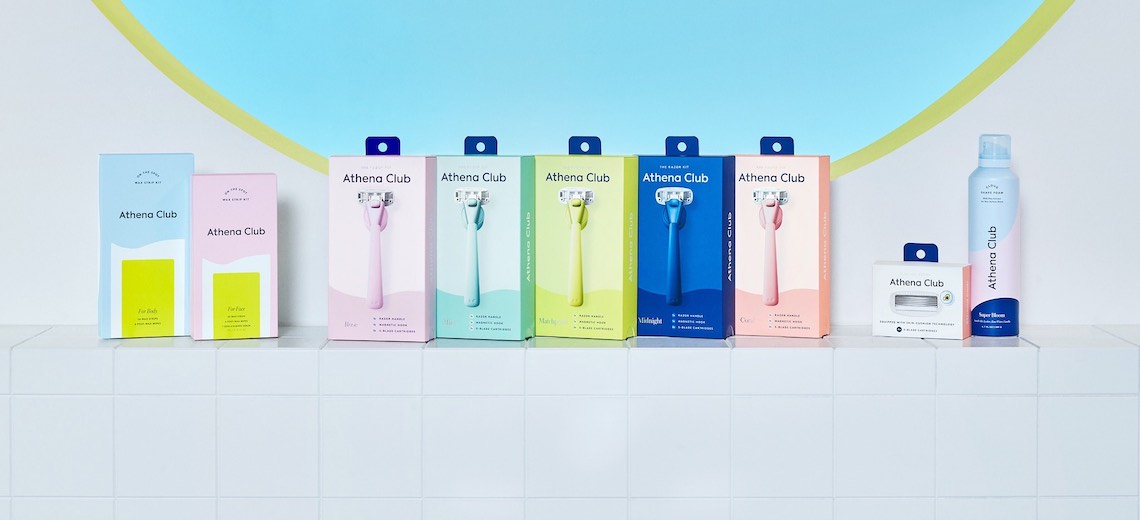Personal care brand Athena Club has officially become the newest DTC startup to shake up the mass retail razor market.
On March 5, Athena Club’s line of hair removal products launched in 1,600 U.S. Target stores and on Target’s website. Formerly DTC, the brand’s Target debut marks its first major retailer partnership. The 3-year-old brand has secured $40 million in equity and debt financing to support its expansion. The launch is the latest example of formerly online-only razor startups making their way to big-box shelves, helping to chip away at industry stalwarts’ market share in the category.
The products entering Target include five different colors of razor kits, blade refills, shave foam and wax strip kits, all of which will be stocked in the women’s shaving category. To prepare for the launch, the brand adopted less minimalist packaging to stand out on shelves, a trend among DTC brands entering retailers. Colorful boxes feature images of the brand’s design-focused razors.
“We loved our DTC packaging, but for retail, you need to see what the product looks like,” said Athena Club co-founder and co-CEO Maria Desmarais.
Athena Club experienced 140% revenue growth in the last 12 months and is on track to grow by another 250% in 2023, according to Maria Desmarais and co-founder and co-CEO Charles Desmarais. Its customer return rate is 93% across all categories including razor blade refills.
While the brand offers both individual orders and replenishing subscriptions on its DTC site, retail is an important part of its distribution strategy due to consumer shopping habits. Athena Club found in a survey of its customers that only 19% prefer to shop online only, while 16% shop in-store only and 65% like to shop both in-store and online.
While hip, design-focused DTC startups in the CPG space are considered to be geared toward millennials, Athena Club’s founders say that the brand is attracting all age groups.
“When we started the brand, we weren’t sure what age demographic we would appeal to, and it’s really been an even split from 18 to 55-plus,” said Charles Desmarais. The co-founders also emphasized that the brand sees orders from 60% of U.S. ZIP codes in both urban and rural areas.
In the women’s razor space, brands like Athena Club, Billie and Flamingo have been shaking up traditional marketing practices of giants like Gillette and Schick. Along with introducing new design aesthetics, they’ve addressed taboos around hair removal, such as actually showing a razor shaving hair rather than featuring smooth, bare skin in marketing.
Athena Club, for example, ran a campaign in October that “showed how people shaved in different ways, whether it was a pregnant person who can’t really see anything down there or a couple swapping razors,” said Maria Desmarais.
Razor startups have been cutting into conglomerates’ market share: Gillette’s market share in the razor category dropped to below 50% as of 2017, according to Euromonitor, after taking up 70% a decade earlier. In the women’s shave category, Target also stocks Harry’s-owned Flamingo. Billie, which is now owned by Edgewell, is sold at Walmart.
Athena Club’s $40 million funding round comes from a combination of existing investors and bank funding to “scale us to the next phase of growth,” said Maria Desmarais.
In the future, the brand is hoping to expand its wider product range, which also includes tampons and personal care, to retailers. It launched in Canada last year and is planning for further international expansion, as well as new retail partners and more product categories in the next 24 months.




